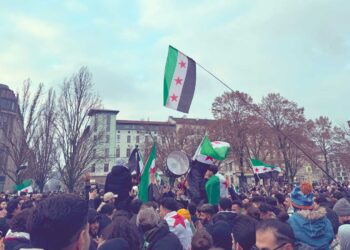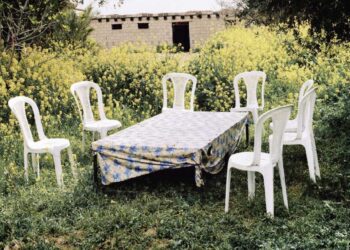How does a genocide sound? Amid bombs, missiles, explosions, what silences does it impose?
And what sounds can an international solidarity front produce? How can one exploit reverberation, exercise echo? How can all frequencies be occupied to finally make the inaudible present?
Militant, communal, and self-organised radios have always fought silencing, historically becoming platforms for advocacy and resistance, and for the dissemination of culture, music and the sound identity of peoples. Even today, through the network, some radio projects continue to narrate and denounce colonial violence in Palestine.
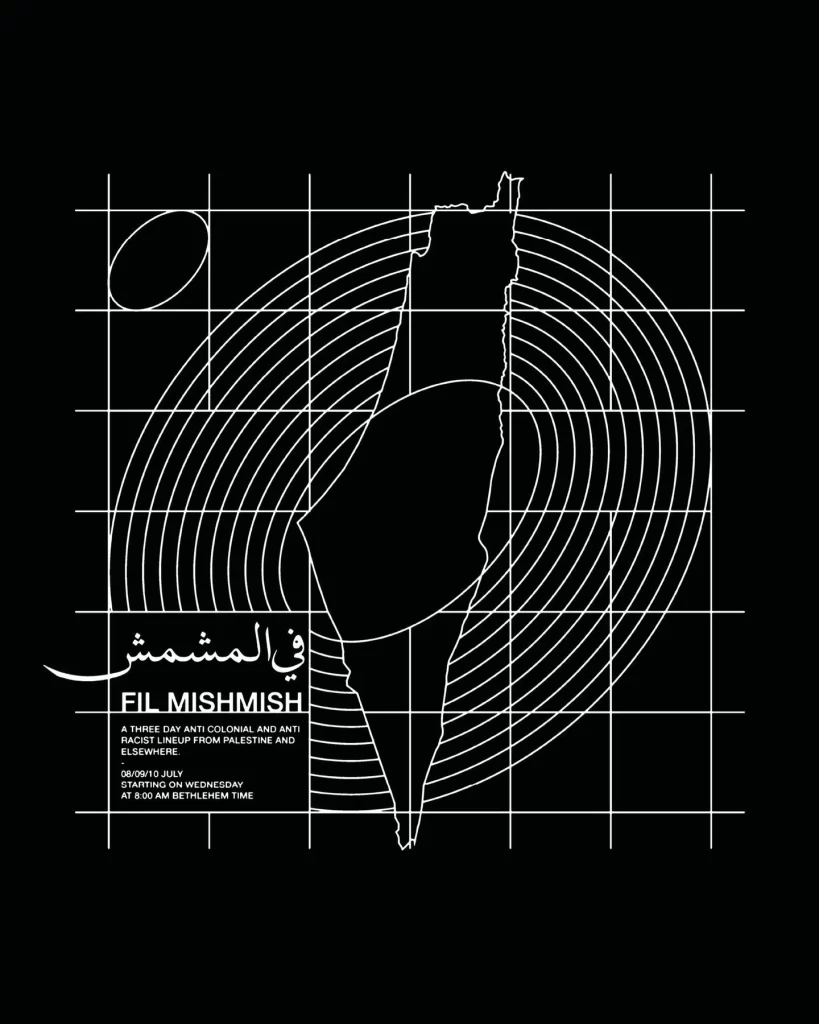
Radio Alhara
In June 2020, at the height of the Covid-19 pandemic, Radio Alhara was born between Bethlehem and Ramallah. The founders, Elias and Yousef Anastas, Saeed Abu Jaber, Mothanna Hussein, and Yazan Khalili are musicians and creatives. They think of the radio as a cultural centre, a way to produce and share their music from a distance.
Radio Alhara is a self-managed community radio, able to be sustained thanks to a network of collaborations all over the world. The community is made up of ‘residents’, artists who have a dedicated monthly space that they curate by projecting sounds and voices that are often muted, contributing to the streamed programme by uploading some of their mixes to the soundcloud channel.
The more political programmes began in conjunction with the Black Lives Matter movement and following the explosion in the port of Beirut in 2020.
The first, more structured one is Fil Mishmish, which could be translated as ‘in apricot time’, a sweet, all too brief time. This sound protest was an international collection of voices against Israel’s desire to annex more West Bank territories. Initially conceived as a continuous 24-hour broadcast, an invitation was launched on the web for participants to send in their own form of sound reaction and solidarity. In the end, the materials received filled three days of lineup, and were broadcasted on the 8th, 9th and 10th of July 2020, garnering some 17,000 listeners.
Among the many contributions that enlivened those hours was that of Leila Moon, an Algerian DJ, musician, and resident artist at the radio station. She contributed an embroidery of sounds from the Maghreb, including raï, Arab pop, combined with electronic passages and grafted popular songs from the Palestinian liberation movement, including the closing words to the voice of Miriam Makeba who sang one of the most popular anti-war songs: ‘It’s better to stop. Hey, what’s that sound? Everybody look what’s going on…’
The experiment that was Fil Mishmish inspired many more sound actions. In 2021, Sonic Liberation Front was created as a reaction to the escalation of violence by the Israeli occupation forces storming Al-Aqsa Mosque during Ramadan, forcibly evicting Palestinian residents in the Sheikh Jarrah neighbourhood of East Jerusalem, and the bombing of Gaza for 11 days.
‘Todas las manos, todas las voces…’ (All hands, all voices), sings Mercedes Sosa, opening and closing Nicola Jaar’s contribution for Sonic Liberation Front on 22 May 2021. The programme is a chorus from Latin America, moving between Jaar’s songs inspired by the revolutionary protests in Chile in 2019-2020 and the uprisings in Colombia in 2021, together with popular songs of similar struggles, a gesture of solidarity and evidence of an indissoluble link between the liberation struggles of indigenous peoples.
‘Toda la sangre puede ser canción en el viento. Canta conmigo, canta, hermano americano. Libera tu esperanza con un grito en la voz’. (All blood can become a song in the wind. Sing with me, sing, my American brother. Free your hope, with a cry, with your voice).
After 7 October 2023, Radio Alhara never stopped paying attention to the voices of the Palestinian people. In the meeting ‘Sounds and Ignitions from Palestine to the World’, in Milan, I found myself together with artists and researchers linked to Palestine by identity or by choice, discovering how much, despite the tragedy, Radio Alhara is continuing its creation and cultural production.
Toni Cutrone, musician and author of the Mai Mai project, shared his recent experience in Palestine. The artist had been invited by Radio Alhara to the Wonder Cabinet space for the ‘Sound of Places’ residency project, held between May and June 2024.
Together with a dozen or so artists, sound craftspeople, and researchers, he went to the Cremisan Valley, a rare natural space around Bethlehem that is constantly under threat. He listened to a range of soundscapes, from the procession to the Church of the Nativity to checkpoints and olive groves. He collaborated with musicians such as Abul3ees, a Palestinian rapper from Jerusalem, using traditional instruments such as the buzuq (Karam Fares), riq and bandir (Jihad Shouibi), and recorded funeral mournings with Maya Al Khaldi.
Along with all this material, he mixed excerpts from the sound archive of the Popular Art Center in Ramallah, which collects recordings from the 1990s to the present.In addition to being broadcast on Radio Alhara, his creation is also filmed in Italy.
During the same event, Noura Tafeche and Condoii presented their research work and radio creation for Radio Alhara ‘Identity and Indigenous Perspectives’. Indigenous identity is a condition and terrain of an alliance, one that reveals the traces of a colonial past common to the two artists, albeit from different contexts. The story of centuries of resistance of the peoples of Abya Yala and Falastin is told in the work starting with some musical instruments that the artists play synchronously. Without romance or folklore, the result is out-of-tune notes, dissonances rather than harmonies, representative of exile and contemporary diasporas.
Learning Palestine
This performance by Noura Tafeche recites little-known verses by Mahmoud Darwish, in which the Palestinian poet speaks from the point of view of an indigenous person from the Americas, focusing on the connection with the land, in its natural elements. One can hear the poet’s voice reading the same verses in Arabic in the Until Liberation I radio broadcast offered by Learning Palestine, a group of artists, activists, and researchers who regularly collaborate with Radio Alhara.
The collective has created a web platform to share and disseminate knowledge about the Palestinian liberation struggle, experimenting with new ways of circulating knowledge outside of social media and their policies of censorship and control. At the same time, the site features pamphlets already paginated to be printed and distributed as fanzines.
Learning Palestine also features two radio broadcasts, Until the Liberation I and II, each lasting twelve hours.
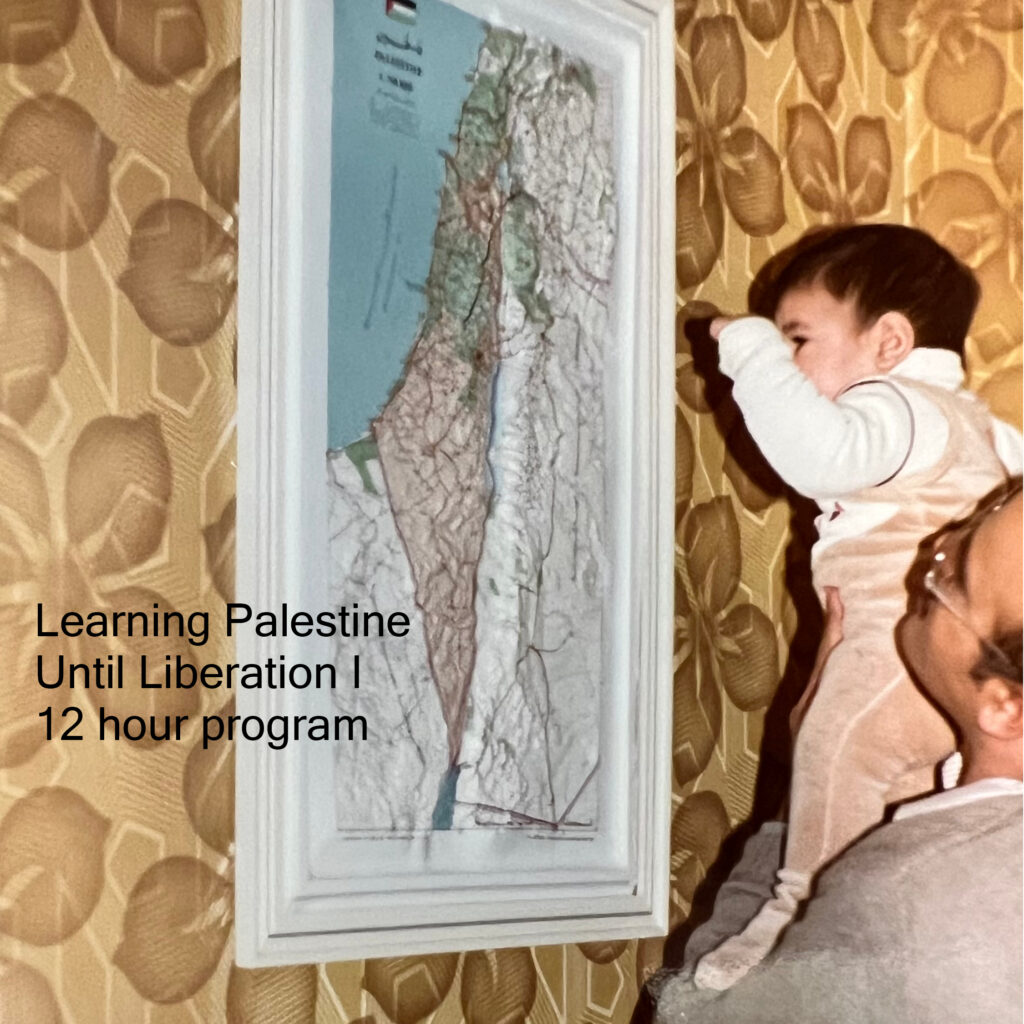
The first episode is a mosaic of speeches, poems, songs and sounds that reconstruct the Palestinian struggle inside and outside the land of Palestine.
We can hear John Berger reading Letter from Gaza by Ghassan Kanafani, Edward Said in a long interview from 1986, a lunge on the history of Black solidarity, Angela Davis’ disruptive speech at Oranienplatz in Berlin in 2022, Judith Butler talking about BDS and anti-Semitism, or a reconstruction by Ilan Pappe from 1948, and more recent appeals such as Fred Moten’s.
Songs of marriage, birth and death, which is inserted among the many languages in which Palestine has been and continues to be spoken. A song in Swedish closes the release: Leve Leve Palestina (Long Live Palestine).
Until Liberation II, on the other hand, is designed to go back to the roots of the struggles, understand their history and inform the present.
The introduction reads: ‘despite the differences in our struggles, Palestine remains an embodiment and extension of these and other struggles for life and liberation, against racism, colonialism, imperialism and rising fascism’.
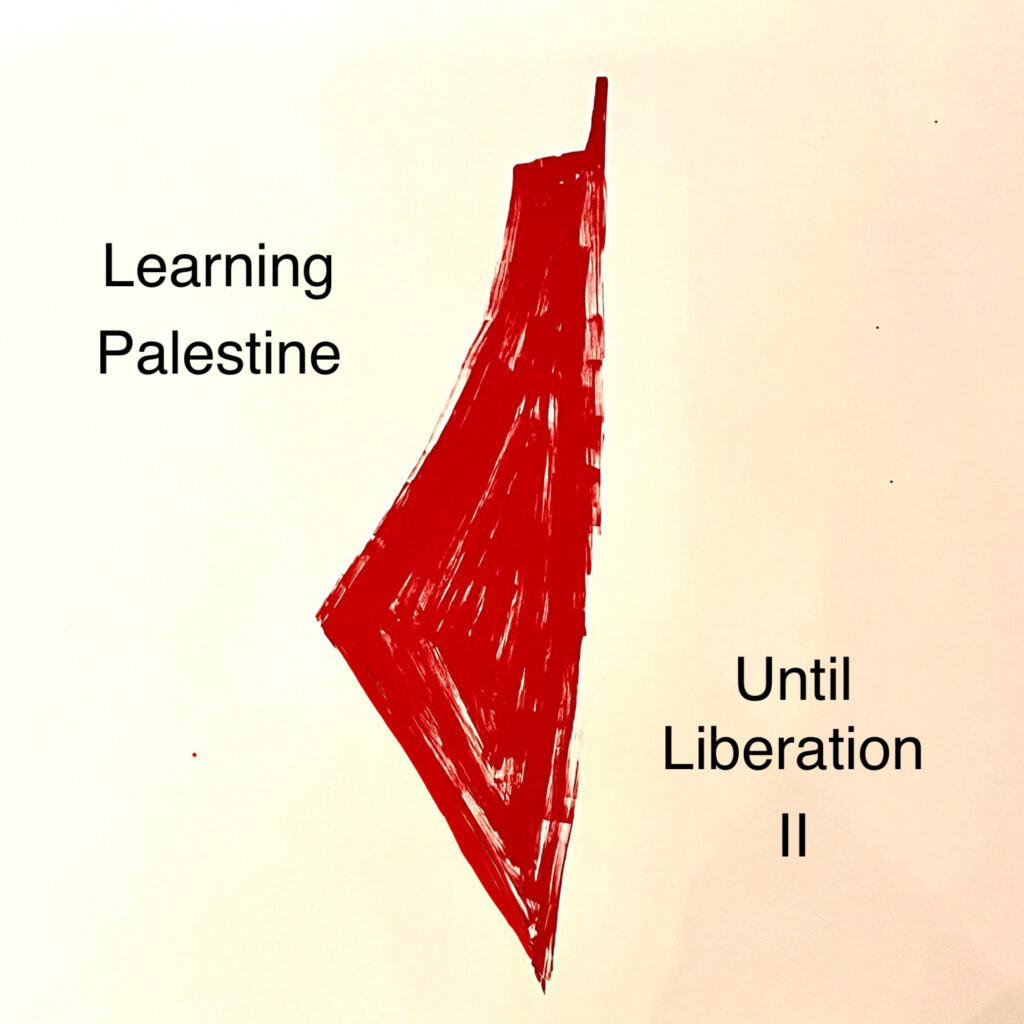
Again, it represents a polyphony of struggles between South Africa, Abya Yala and Asia that have always spoken to each other. Of particular relevance is the relationship between Algeria and Palestine in the intertwining of decolonial movements. Malika Rahal, an Algerian historian, traces the assonances between the two events: Fanon’s thought is taken up by Said’s words, a lecture retraces the stages of the Algerian war of independence. The French-Algerian-Palestinian filmmaker Lina Soualem closes with a personal story and the complex relationship between a skin syndrome she suffers from, the history of her body, and her family’s migrations.
24h Palestine
Another international solidarity action chooses the 24h format; 24h Palestine is a global radio event of anti-colonial alliances. These are independent, militant, artistic radio stations around the world broadcasting the same sounds at the same time to prove the common commitment to the Palestinian liberation cause. Since 7 October there have been three editions, each time with different content and a widening network.
Streaming starts from Radio Alhara in Bethlehem and expands to Radio Flouka (Paris/Mena Region); Radio Blackout and Radio Onda Rossa (Italy); The Mosaic Rooms (UK); Libreria Proyeccion (Chile); La Parole Errante and Radio Galère (France); Station of Commons/Lumbung Radio (Transnational); Pan African Space Station (South Africa); Radio Tropiezo and Radio Nopal (Mexico); Radio Oroko (Ghana); Dublin Digital Radio; Ja Ja Nee Nee Radio (Netherlands); Stegi Radio (Greece); Radio Liberté (Burkina Faso); Radio Djiido (Kanaky). These were joined by broadcasting stations set up for the occasion in Beirut, Maiotta, Reunion Island and Cairo.

The third and most recent edition was broadcast on 28 and 29 September 2024, assembling sound fragments from the university occupations, from the oppositions of the autonomous dockworkers’ collective in Genoa to the departure of the ships carrying arms, the voices of Palestinian refugees in the camps in Lebanon with those of solidarity from Bangladesh, the Pacific, Finland, boycott actions and pieces of revolutionary music.
The palimpsest was dedicated to the time of struggles, to the transition from emergency to long-term, starting with the question: ‘How can we go beyond the declarative aspect of our solidarity to break the deadly imperialist and capitalist alliances? The long times of struggles deploy strategies, reconfiguring space through their resonances’.

All these radio practices remind us of the hard-to-reach sound dimension of war. Sound can be an instrument of torture, of terror, or a form of ‘occupation of the senses’, i.e. one of the ways in which colonialism performs its domination, controlling sensory access to the world of the colonised.

Taking back the spaces of the sensible becomes an act of everyday resistance, generating other ‘signals’ that reformulate space and time, where transmission transcends territorial boundaries and rematerialises in physical spaces and moments of aggregation, where voices reach bodies and make listening an act of witnessing.
*This article was produced in collaboration with Orient XXI, where it was first published in Italian.





